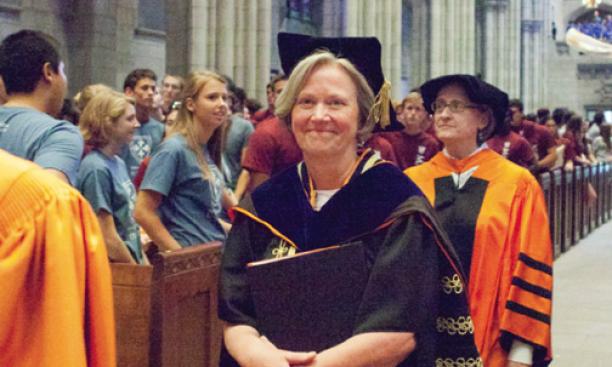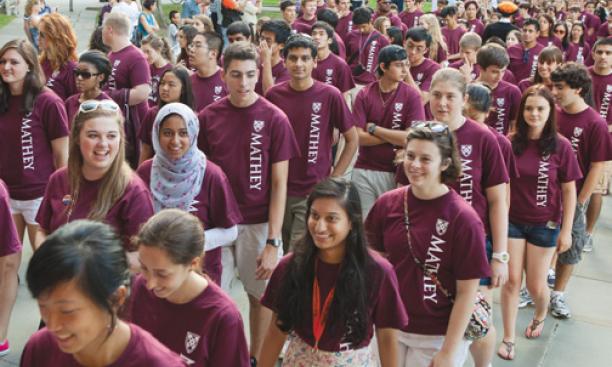

On September 9, at Opening Exercises, I welcomed 1,357 new freshmen — the largest class to matriculate in Princeton’s history — together with other new and returning members of our University community. In my address, I encouraged each member of the Class of 2016 to “occupy Princeton” by making it uniquely his or her own, reminding them that in 2012, Princeton is not solely a location in New Jersey but a gateway to educational opportunities throughout the world. Here is part of what I said. — S.M.T.
Opening Exercises is one of the truly joyous occasions at Princeton because it marks the beginning of a great adventure — your great adventure. At this moment in your Princeton education everything is possible — every door stands open, every dream has the potential to come true. You are about to Occupy Princeton.
Now don’t panic — I don’t mean to suggest that you are going to live in a soggy pup tent on Cannon Green for the next four years. Instead, I am co-opting that phrase from last year’s political season to preview what I hope will be the many ways in which you will seize the moment, take this University by storm, make it uniquely your own, and leave it better than you found it.
Let me begin with the most literal meaning of Occupying Princeton. Here you are! Bravo for making the wise decision to attend this University. I suspect that there are almost as many reasons for why you chose Princeton as there are members of the Class of 2016. Some of you knew you wanted to come to Princeton the moment you stepped on this beautiful campus — it just looked and felt like what a college campus is supposed to be. I completely understand that reaction. Even after 26 years, I occasionally find myself dazzled when I encounter a long vista through Gothic arches, or the sky’s reflection on the glass façade of Sherrerd Hall. Geography matters, and you will find inspiration in living and working in a setting that can continually astonish.
Some of you were attracted by the opportunity to work with faculty who are not just extraordinary scholars, scientists, and engineers, but also are committed to sharing their knowledge and erudition with the next generation. That is a great reason to choose Princeton — you will come to know faculty as individuals, not just as talking heads at the front of the class. And rather than being intimidated by the prospect of writing a senior thesis, some of you were motivated to come to Princeton by the chance to take responsibility for your own intellectual development, rather than being a passive recipient of learning. Writing a senior thesis may seem daunting to you right now, but it will be the most exhilarating and rewarding experience of your academic career, and the one you remember best.
There are those of you in the Class of 2016 who had siblings who attended Princeton, or parents or grandparents, and undoubtedly received regular doses of Princeton lore around the family dinner table and have a closet full of orange and black paraphernalia. Others of you had never heard of or even considered Princeton until a teacher or guidance counselor or family friend suggested that you should take a look. And by the way, it has been my experience that the moment you arrive on campus, those differences completely evaporate, and you all become Princetonians to the core. Some of you had something very specific in mind when you applied to Princeton — to study with world-class mathematicians; to combine a liberal arts education with a serious commitment to the arts; to play on a sports team that contends for Ivy championships on a regular basis. The great majority of you, however, are completely open to what lies ahead and plan to use your first year or so to explore the tremendous smorgasbord of opportunities that Princeton has to offer.
But whatever your path to Princeton, you are now a member of the Class of 2016, collectively poised to Occupy Princeton for the next four years. As I warn each freshman class, the next four years are going to go by in the blink of an eye. If you do not believe me, ask any member of the senior class. That look of panic in their eyes is not solely brought on by the fact that they are still struggling to find a topic for their senior theses. It also reflects their realization that there is a light looming at the end of the tunnel, and they have just one more year to savor and extract the full worth of this place.
So Occupying Princeton means first and foremost carpe diem — seize the moment, take responsibility for consciously and conscientiously carving out your own vision of a Princeton education. For there is no quintessential Princeton experience, especially for a class as broadly diverse in every imaginable way as yours. Each Princeton experience is forged from a highly individual spectrum of interests, talents, initiative, focus, and, yes, serendipity. Luck matters. The roommates you are randomly assigned, the conversations you happen upon in the dining halls, the preceptor who takes a special interest in your work, the play you decide to audition for on a whim — who knows what will turn out to be a revelatory moment in your Princeton experience?
But as the 19th-century French scientist Louis Pasteur famously said, “Chance favors only the prepared mind.” A prepared mind is open to courses in disciplines and fields you have never encountered before and to testing whether subjects that fascinated you in high school are truly your calling. A prepared mind will explore extra-curricular interests that bring you in contact with students who come to Princeton with very different life trajectories than yours, and who will challenge you to grow as an individual. With a prepared mind, you can leave your mark on Princeton by the ways in which you choose to spend your time and engage with your classmates and fellow students. But let me be clear — Occupying Princeton well means making real choices. The buckshot approach to Princeton does not work. So take your time, pace yourself, and don’t try to do everything all at once.

Although it may sound like I am about to contradict myself, Occupying the Princeton of the 21st century requires that you leave Princeton from time to time to explore the rest of the world. This was not always the case; in fact, Princeton was often criticized by its alumni for discouraging their efforts to study abroad. However, that began to change in 1996, when we celebrated the 250th anniversary of the founding of Princeton and President Harold Shapiro used the occasion to modify our informal motto. “Princeton in the Nation’s Service” became “Princeton in the Nation’s Service and the Service of All Nations” — words now carved into the walk in front of Nassau Hall. Whether you describe the world as flat, or shrinking, or massively interconnected, it has profoundly changed, and modern well-educated citizens need to be cosmopolitans — a word that Professor of Philosophy Anthony Appiah has used to describe a person who is genuinely familiar with and at ease moving between cultures, without losing sense of his or her own identity.
Economists and sociologists predict that many of you will spend some fraction of your lives in different countries with different languages, religions, and political beliefs. To be successful, you will need to be cosmopolitans, and the best way to acquire that trait is to engage the world — by getting to know students from other countries here at Princeton and by studying the languages, cultures, religions, histories, and political philosophies of other societies. But as meaningful as those experiences can be, they are no substitute for first-hand experience, and you will quickly discover that Princeton now offers many options for you to explore other parts of the world — semester- and year-long study abroad opportunities at excellent universities and myriad summer experiences, including Global Seminars, intensive summer language training, research opportunities, and internships around the world. It is not too early for you to begin planning your strategy for becoming a cosmopolitan.
As you know, the Occupy movement began last fall in Zuccotti Park near Wall Street in New York as a protest against the growing inequality in income and opportunity in the U.S. and in many other countries around the world. The movement’s rallying cry was “We are the 99 percent,” to underscore the point that the widening gap in wealth is benefiting a very small percentage of the population. With your matriculation at Princeton, and irrespective of your family circumstances up to this moment, you have now become part of the 1 percent, not in terms of wealth, but certainly in terms of future opportunity. Admission to Princeton is a privilege that is bestowed on very few individuals, and with it comes a responsibility to use your education to make the world a better place. “Princeton in the Nation’s Service and the Service of All Nations” is not a hollow phrase, but a call to action that justifies the immense effort and resources that go into educating each of you. By virtue of that education, and the credential you will earn that signals to the world that you have worked prodigiously hard to pass a very high educational bar, you will have a dizzying array of options before you. We are agnostic about what you choose to do, but we do insist that it have a purpose that is larger than you. In that sense, Occupying Princeton is not an end in itself but, rather, a means of preparing yourselves for many occupations — and vocations — in a world that sorely needs the skills and qualities of mind you bring to this University and will surely enhance over the next four years.
I am looking forward to getting to know each of you and to cheering you on inside and outside the classroom as you Occupy this great University. I hope you will leave our campus, saying, as generations of students have said before you, “This place changed my life.” Welcome to Princeton!
